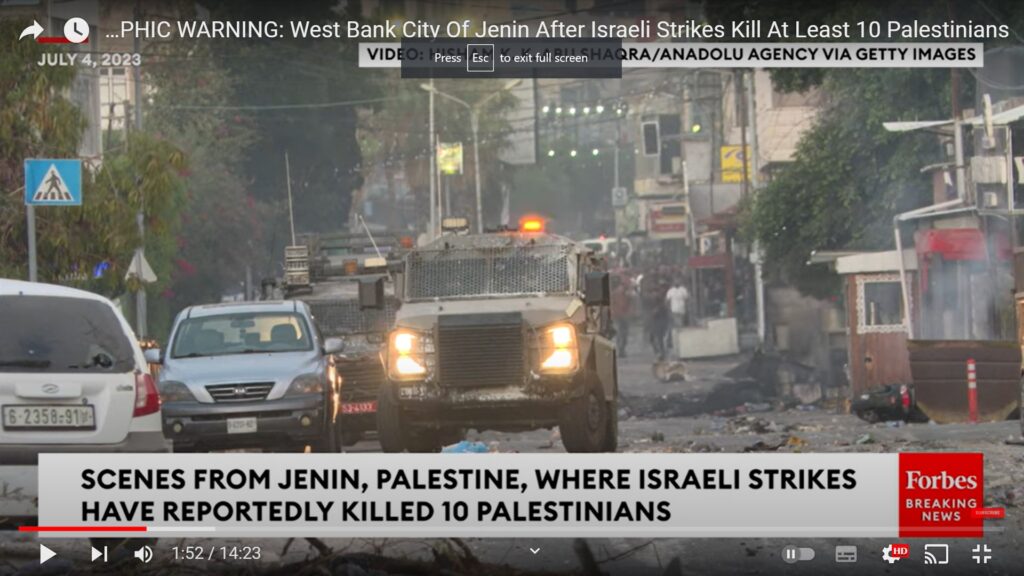The IDF’s operation in Jenin has concluded, with forces having withdrawn from the city.
Two significant points define this operation: firstly, the IDF’s offensive initiative in entering the Jenin refugee camp, marking the first major operation of its kind in over two decades, aimed at dismantling terrorist infrastructures.
Secondly, the operation’s impact on weakening the terrorist activities of armed groups in Jenin, anticipated in the coming period due to the demolition of these infrastructures and the arrest of dozens of wanted terrorists.
The IDF’s operation in the Jenin refugee camp also serves as a precedent for future operations expected in the refugee camps in the Nablus and Tulkarm areas.
However, it is crucial to recognize that the restoration of the terror infrastructure in the Jenin refugee camp can be swiftly accomplished using Iranian funds.
The terrorists of the “Jenin Battalion” will resume their attacks, aiming to demonstrate that their military capabilities remain intact and that the IDF allegedly failed in its operation.
Jenin has emerged as the terrorism capital of Judea and Samaria, witnessing 50 shooting attacks against Israel since the beginning of the year and harboring 19 terrorists.
It has become a sanctuary for terrorists from various regions of Judea and Samaria, considered a “liberated” area from Israeli and PA control.
The IDF’s military action in Jenin was executed professionally and with precision, despite the unfortunate loss of an IDF soldier.
The damage caused to the IDF’s Panther-type armored vehicle by a large explosive device, resulting in injuries to seven soldiers last week, expedited the operation.
The political leadership acknowledged that terrorist organizations sought to transform the city of Jenin into a region akin to the Gaza Strip.
Although smaller in scale compared to the “Protective Wall” operation in Jenin during the second intifada in 2002, the IDF’s operation represents a crucial initial step in Israel’s fight against terrorism in northern Samaria.
The IDF will continue to employ targeted assassinations, as well as utilize helicopters and drones, in its efforts against terrorism in the region.
The IDF acted with utmost care to prevent harm to innocent civilians in the Jenin refugee camp, and the Biden administration exhibited patience, acknowledging Israel’s right to self-defense.
Israel now faces several imperative tasks:
- Halting the Iranian takeover of northern Samaria through the Islamic Jihad.
- Disrupting the terrorist infrastructure in the Nablus and Tulkarm areas while preventing the resurgence of terrorist activities in Jenin.
- Preventing the smuggling of weapons from Iran via Syria and Jordan to armed groups in northern Samaria.
- Combating the smuggling of funds from Iran to impede terrorism financing.
The Iranian Octopus continues to tighten its grip on Judea and Samaria, with Iran’s Supreme Leader, Ali Khamenei, instructing the leader of the Islamic Jihad, Ziad Al-Nakhallah, to establish terror battalions in all Palestinian cities throughout the region and arm them.
Khamenei is resolute in transforming Judea and Samaria into a new front against Israel, generously funding it with Iranian resources and weapons.
The IDF’s recent operation in the Jenin refugee camp has demonstrated that the multi-front strategy pursued by the resistance axis, led by Iran, is ineffective.
Despite the promises made by Hamas and the Islamic Jihad, only after the IDF forces departed from Jenin, five rockets were launched from the Gaza Strip towards Israel but were successfully intercepted by the “Iron Dome” system.
Residents of the Jenin refugee camp have voiced their discontent, feeling abandoned by Hamas, Islamic Jihad, and Hezbollah in their battle against Israel.
Iran’s “uniting the fronts” strategy has failed to prove its effectiveness on the ground.
The IDF must capitalize on the momentum generated in the war on terror and promptly undertake similar military operations in Samaria.
While Israeli deterrence has improved, it is crucial to recognize that this is only the beginning.
In northern Samaria, around 2,000 armed terrorists are still concealed within refugee camps and villages, alongside extensive terrorist infrastructures. The IDF has a substantial amount of work ahead, making it vital to concentrate on maintaining the momentum and initiating additional operations as soon as possible




